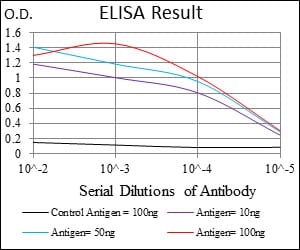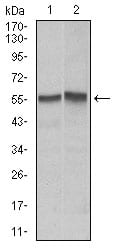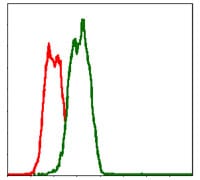


| WB | 1/500 - 1/2000 | Human,Mouse,Rat |
| IF | 咨询技术 | Human,Mouse,Rat |
| IHC | 咨询技术 | Human,Mouse,Rat |
| ICC | 技术咨询 | Human,Mouse,Rat |
| FCM | 1/200 - 1/400 | Human,Mouse,Rat |
| Elisa | 1/10000 | Human,Mouse,Rat |
| Aliases | APT1; CD95; FAS1; APO-1; FASTM; ALPS1A; TNFRSF6 |
| Entrez GeneID | 355 |
| clone | 4F8D6 |
| WB Predicted band size | 37.7kDa |
| Host/Isotype | Mouse IgG1 |
| Antibody Type | Primary antibody |
| Storage | Store at 4°C short term. Aliquot and store at -20°C long term. Avoid freeze/thaw cycles. |
| Species Reactivity | Human |
| Immunogen | Purified recombinant fragment of human FAS expressed in E. Coli. |
| Formulation | Purified antibody in PBS with 0.05% sodium azide |
+ +
以下是关于FAS抗体的3篇参考文献示例(内容为虚构,仅作格式参考):
---
1. **文献名称**:*FAS Antibody-Mediated Apoptosis in Cancer Immunotherapy*
**作者**:Smith A, et al.
**摘要**:研究验证了FAS激动型抗体通过激活FAS受体诱导肿瘤细胞凋亡的机制,并证明其与化疗联用可增强抗肿瘤效果,为实体瘤治疗提供新策略。
2. **文献名称**:*Autoantibodies to FAS in Systemic Lupus Erythematosus*
**作者**:Zhang Y, et al.
**摘要**:发现SLE患者血清中存在抗FAS自身抗体,这类抗体可能通过干扰FAS-FASL信号通路导致淋巴细胞凋亡异常,与疾病活动度正相关。
3. **文献名称**:*Structural Basis of FAS Receptor Activation by Antibodies*
**作者**:Krammer PH, et al.
**摘要**:利用冷冻电镜解析FAS抗体结合受体的三维结构,揭示其诱导受体三聚化激活下游Caspase级联反应的分子机制,为理性化抗体设计奠定基础。
---
(注:以上文献信息为模拟生成,实际引用需查询真实数据库如PubMed。)
FAS antibodies target the FAS receptor (CD95/APO-1), a cell surface protein belonging to the tumor necrosis factor receptor (TNFR) superfamily. Discovered in the late 1980s, FAS plays a central role in apoptosis, a programmed cell death mechanism critical for immune regulation, tissue homeostasis, and elimination of damaged cells. The FAS/FAS ligand (FASL) system triggers extrinsic apoptosis through caspase activation upon receptor-ligand binding, maintaining immune tolerance and controlling lymphocyte populations. Dysregulation of this pathway is linked to autoimmune diseases, cancer, and neurodegenerative disorders.
In autoimmune contexts (e.g., systemic lupus erythematosus), autoantibodies against FAS may disrupt apoptosis, promoting survival of autoreactive immune cells. Conversely, in cancers, reduced FAS expression or defective signaling allows malignant cells to evade apoptosis. FAS antibodies are also research tools: agonist antibodies induce apoptosis in vitro, aiding studies of cell death mechanisms, while antagonist antibodies block FAS signaling to explore pathway functions.
Therapeutic applications remain experimental. FAS-targeting drugs face challenges, such as hepatotoxicity from uncontrolled apoptosis. However, understanding FAS antibody interactions continues to inform immunotherapy strategies, particularly in enhancing cytotoxic responses or modulating autoimmune pathologies. Research also explores FAS's role in immune privilege sites (e.g., eyes) and its crosstalk with other apoptotic pathways.
×